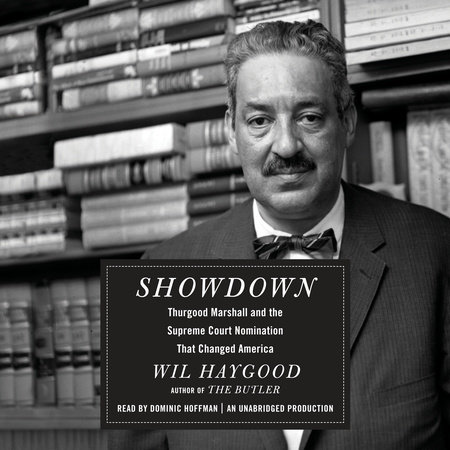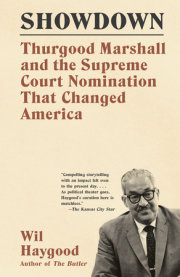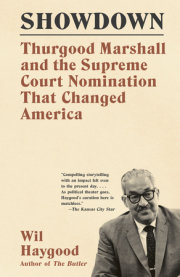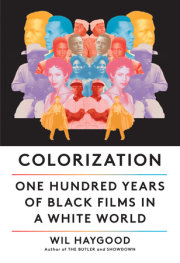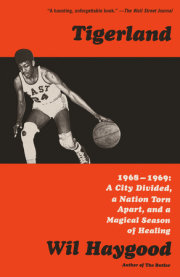1
The Ghosts of Little Rock
Please, sir, no nigger on the Supreme Court bench.
—an Arkansas family in a letter to Senator John McClellan about the Marshall nomination
John mcclellan was going to stop Thurgood Marshall.
He simply could not imagine the likes of Marshall on the U.S. Supreme Court, so he convinced himself he could prevent it. He was Senator John McClellan, and he was powerful, and people feared him. He had a hard face—a dead ringer for the comic Jack Benny if Benny had been dipped in plaster—and a hard, scratchy voice. He wore horn-rimmed glasses from which, time and again during previous hearings while sitting in judgment of others, he peered down on witnesses with menacing glares. He combed his hair straight back, in a severe manner. McClellan was one of the Senate barons—men who had served for years and seemed to have grown out of the very building that housed the U.S. Senate. He loathed small talk and abhorred social teas and the like, which many senators and their wives seemed to enjoy. Even when his Arkansas constituents visited his Washington office, he seemed impatient, as if he wished they could state their business as fast as possible and be on their way. He’d shoot an aide that look and then the aide would begin motioning toward the door and McClellan would toss final words at his guests: thanks for coming by, say hi to the folks back home, don’t forget to take a souvenir.
He had been sent to Washington by Arkansas voters, first as a congressman in 1934 and then, in 1942, as a U.S. senator. And now he found himself with a coveted seat on the powerful Senate Judiciary Committee. He told his aides to start digging. He wanted as much information on Thurgood Marshall as he could get, and he wanted it as fast as he could get it. John McClellan looked upon himself as a force for good, standing between Thurgood Marshall and the Supreme Court of the United States of America.
In Washington, McClellan prided himself on his activities, his constant motion. At one time, he sat on fourteen subcommittees. In 1954, he found himself on a committee with the Wisconsin senator Joseph McCarthy, who was galloping around the nation’s capital on a one-man witch hunt for Communists. McCarthy had charged the State Department with having dozens of Communists in its employ. At a time when Americans were fearful of Communism, McCarthy’s charges landed him on the front pages. Many were riled up. All of this intrigued McClellan, as ready as anyone to corral a Communist. But McCarthy, who was a shambling and reckless figure, soon made McClellan nervous. It was McCarthy’s lack of discipline and some of his aides who were utterly unprofessional. “I’m fond of Joe McCarthy,” McClellan allowed, “but he’s getting out of hand, and we have to do something to control him.” McClellan quit the McCarthy-led committee he was on. He escaped the shadow of McCarthy with prescient timing, as the Army-McCarthy hearings, nationally televised, exposed McCarthy as a mean-spirited liar. The Senate eventually censured him.
In 1957, McClellan led the celebrated Senate Labor Rackets Committee, which took on mobsters and their henchmen and eventually exposed the criminal underworld in America. That was the moment that John McClellan’s profile rose in America. Because of disclosures exposed by his committee, two teamsters, Jimmy Hoffa and Dave Beck, had been sent to prison. Another round of hearings in 1963 offered up Joseph Valachi, a mobster who seemed to thrill television viewers with his insider’s account of cold-blooded doings in the Mafia. The Omaha World-Herald had once said of McClellan that he possessed a “steely mask of Old Testament righteousness.” If John McClellan had stopped gangsters, he figured he could certainly thwart LBJ’s new Supreme Court nominee.
In Washington, they didn’t bother to refer to him as Senator McClellan; they called him “the Chairman,” because he had been chairman of the Senate Permanent Subcommittee on Investigations, as well as chairman of the Senate Select Committee on Improper Activities in the Labor or Management Field, which was the committee that provided him with the tools to go after the mobsters. Because those racketeering hearings were nationally televised, everyone knew Senator John McClellan. The young aides in the Johnson White House knew well how dangerous McClellan could be to their efforts in getting Thurgood Marshall onto the U.S. Supreme Court. “Virtually every speech he made inscribed a rising curve from the prudent statement of fact to polemical rage, his powerful voice quavering with indignation,” is how the Johnson aide Harry McPherson put it.
The Johnson administration had drawn a battle line. Thurgood Marshall was the lawyer who had won the Brown v. Board of Education ruling, a ruling that led to utter embarrassment in McClellan’s home state in the fall of 1957, when nine Negro schoolchildren had tried to desegregate Little Rock Central High School and been stopped by whites hurling epithets, spit, and large rocks. (It was also the year that Time magazine named McClellan its Man of the Year.) Reporters on the scene to cover the story were chased and bloodied by the mobs. This had forced President Dwight Eisenhower to go into military mode and dispatch troops to protect the children. The troops had to remain at the school watching over the Negro children for an entire year. Little Rock was thus seared into the nation’s psyche as mean and bigoted. And on his trips back home to Arkansas at the time, to attend all those social events and grand openings and visit family as all politicians do, John McClellan had to endure all the chatter about Little Rock, about how the government was attacking states’ rights, how Negroes were trying to take over the schools. And all he could do was assure his constituents that he was doing everything he could to protect their way of life, the southern way of life. It made McClellan angry, though, how he had to take up all of this time defending himself and how hard he was working in Washington to keep Arkansas as it had always been. Thurgood Marshall, if he made it to the Supreme Court, was not going to keep Arkansas as it had always been.
But first, before McClellan could do anything about Marshall, he had to clear his throat. He did not like it one bit that President Johnson had stunned him with the suddenness of the Marshall nomination. After all, he was a southern Democrat like Johnson himself! John McClellan so prided himself on having the pulse of government, of government at the highest levels, of what they were doing over at the White House, that this series of events—a justice departing, then, in a flash, a new nomination—only gnawed at his sense of propriety and even decorum. McClellan couldn’t figure out how all of this had transpired, had been put into motion without any hints falling his way. And he did not like any of it at all.
it was often said around the Johnson White House that what LBJ wanted, LBJ got. And in the summer of 1967, LBJ wanted to put Thurgood Marshall, a Negro, on the Supreme Court. There was a small problem: there was no vacancy nor had a single sitting justice been talking about stepping down from his lifetime appointment. Johnson looked to his Texas roots and saw clearly how he could solve the problem.
Lyndon Johnson had first met the associate justice Tom Clark back in Texas in 1938, when Johnson was a young congressman. The Johnson and Clark families went on outings together, their little children romping across wide lawns. “A friendship developed that included the whole family; it was much more than a professional relationship between the two men,” Tom Clark’s daughter, Mimi Clark Gronlund, would recall. When Johnson’s daughters, Lynda and Luci, became engaged, the Clarks threw parties for them. (There was something interesting about Texas men who had more amenable attitudes toward Negroes than others in the state. “I knew him when he first came to Washington,” Thurgood Marshall would come to recall of Tom Clark. “I knew his mother. And his brother in Dallas . . . His mother, way back—this will go back to the late thirties—her housekeeper, a Negro, ate dinner with her. They ate right at the same table together. Now, back in the thirties, you didn’t do that in Texas.”) Clark had originally been encouraged to come to Washington in 1937 by the House majority leader, Sam Rayburn, who was Johnson’s mentor. Clark joined the Justice Department as a special assistant. After the death of Franklin D. Roosevelt, President Truman appointed Clark attorney general. And when the Supreme Court justice Frank Murphy died in 1949, Truman nominated Clark to the court. Court openings were created, often, by grave and declining health, or death. But in 1967, as Justice Clark’s family knew, he was in good health and had not at all talked of resigning from the court. In order to nominate Marshall, Johnson had to make some fast chess-like moves.
First, Johnson encouraged Attorney General Nicholas Katzenbach to resign, then appointed Katzenbach undersecretary of state. Johnson intended to appoint Ramsey Clark—the deputy attorney general, who happened to be Tom Clark’s son—to the position permanently. But Johnson knew others—inside the legal profession and out—would wonder about a perceived conflict of interest because Clark’s father sat on the high court. But Lyndon Johnson knew people; he knew the dynamics of fathers and sons, how a rising son could make a father swoon with pride, and how a father, if called upon to make a sacrifice for his one and only son, might do it almost as reflex, without giving it a second thought. “He talked to Tom Clark to tell him he wanted to appoint Ramsey attorney general,” Johnson’s aide Joseph Califano would recall. “Johnson needed a vacancy to put Thurgood Marshall on the court. So Tom Clark had to retire, and Johnson got the vacancy.” Decades later, recalling the Johnson maneuverings, Califano could still beam with amazement: “It was a classic Johnson move.”
So grateful was Johnson for Tom Clark’s resignation that he sent Clark and his wife on a once-in-a-lifetime trip around the world. Ostensibly, it was a goodwill mission sponsored by the Department of State with Clark expected to exchange ideas with foreign officials about their respective judiciaries, but it really was a gift to the Clarks for Tom Clark’s stepping down. The couple set foot in more than a dozen exotic locales, among them Honk Kong, New Zealand, Jordan, Indonesia, Greece, Turkey, Tokyo, and finally Rome—where they dined in style and saw the ruins. Mrs. Clark called it their “great adventure.”
The Johnson White House aimed to use surprise as a weapon in its strategic rollout of the Clark-Marshall announcements. And it worked, because some of the Senate Judiciary Committee members—especially the southerners—complained bitterly about the swiftness of the move, which had caught them off guard. “He’d just call Senator Eastland, Senator Thurmond, and say, ‘Senator, I’m nominating Thurgood Marshall to the Supreme Court,’ and before they could say anything,” says Califano, “he’d hang the phone up and call the next senator.” McClellan, James Eastland, Strom Thurmond, and all the other Judiciary Committee members were treated with similarly fast phone calls.
The Marshall announcement unleashed waves of pride within the Johnson White House, a pride that bubbled especially among Negroes nationwide.
The White House, at 1600 Pennsylvania Avenue, had a peculiar and vexing relationship with blacks throughout history. In 1901, President Theodore Roosevelt had the educator—and onetime slave—Booker T. Washington to the White House to dine. The engagement was private, unannounced. But word quickly seeped out. The southern newspapers let the epithets fly: “Roosevelt Dines a Darkey.” “A Rank Negrophilist.” “Our Coon-Flavored President.” “Roosevelt Proposes to Coddle the Son of Ham.” “At one stroke, and by one act,” The Richmond News opined of Teddy Roosevelt, “he has destroyed the kindly, warm regard and personal affection for him which were growing up fast in the South. Hereafter . . . it will be impossible to feel, as we were beginning to feel, that he is one of us.” Not many years later, in 1915, the D. W. Griffith movie The Birth of a Nation opened in theaters. It was based on Thomas Dixon’s novel The Clansman, a vile piece of fiction that painted blacks with evil stereotypes. They were thieves and sexual marauders lusting after white women. The NAACP condemned the movie, but not President Woodrow Wilson, who hosted a screening at the White House, then heaped praise on the movie. Wilson also went on to segregate the federal workforce in the nation’s capital. A Negro was not appointed to an executive White House position until President Eisenhower’s first term, and even that move was fraught with pain. E. Frederic Morrow—a Bowdoin College grad, a CBS public relations executive, a man of steely resolve and great dignity—had done campaign work for the candidate Eisenhower. Members of Eisenhower’s team were so impressed with his work they promised a White House position. When Ike won, Morrow’s phone did not ring. He complained. He was finally given a job at the Commerce Department. But it did not sit well with him; he had been promised a White House position. Republican allies of Morrow’s in New York City put pressure on the White House to deliver on its promise, and Morrow finally became a White House staff member in 1955.
Little wonder Negro newspapers around the nation proudly trumpeted the Marshall nomination.
But with pride aside, the Johnson White House knew the first stop was the Senate Judiciary Committee. It was a historic committee and one of the original standing committees in the Senate, first authorized in 1816. Throughout its history, the committee took on a wide range of assignments, from bankruptcies, to state boundaries, to contested Senate elections. The committee even played a role in the aftermath of Reconstruction, settling matters when it came to Confederate states and their restoration to the Union. It had long been a committee steeped in thorny challenges and national urgency. “There was clear knowledge that there would be a fight,” remembers the Johnson aide Clifford Alexander. “Johnson knew because he came out of the leadership of the Senate. It was key to get the nomination out of the Judiciary Committee. The Democrats were the segregationists.”
Copyright © 2015 by Wil Haygood. All rights reserved. No part of this excerpt may be reproduced or reprinted without permission in writing from the publisher.

